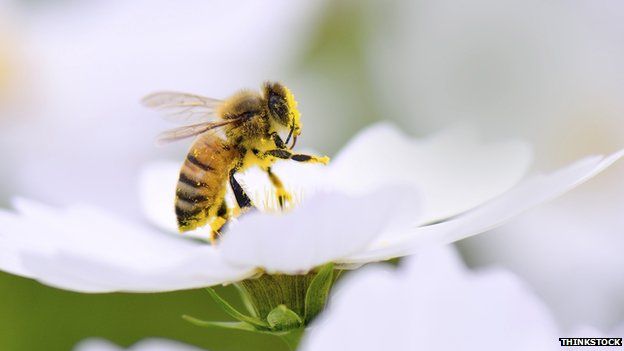Commercial bees threaten wild bees, say researchers
- Published

The trade in bees used for honey or to pollinate crops could have a devastating impact on wild bees and other insects, say scientists.
New measures are needed to stop diseases carried by commercial bees spilling over into the wild, says a University of Exeter team.
Evidence suggests bees bred in captivity can carry diseases that could be a risk to native species.
Bees are used commercially to pollinate crops such as peppers and oilseed rape.
Species of bees used for this purpose, or in commercial hives, are known to suffer from parasite infections and more than 20 viruses.
Many of these can also infect wild bumble bees, wasps, ants and hoverflies.
The study, published in the Journal of Applied Ecology, reviewed data from existing studies to look at the potential for diseases to jump from commercial bees to insects in the wild.
"Our study highlights the importance of preventing the release of diseased commercial pollinators into the wild," said lead researcher Dr Lena Wilfert.
"The diseases carried by commercial species affect a wide range of wild pollinators but their spread can be avoided by improved monitoring and management practices.
"Commercial honey beekeepers have a responsibility to protect ecologically and economically important wild pollinator communities from disease."
'Drastic impacts'
Several diseases of honey bee colonies are known. They include a parasite called the Varroa mite and a virus that leads to deformed wings, which has also been found in wild bumble bees.
Vanessa Amaral-Rogers of the charity, Buglife, said the results of the study showed an urgent need for changes in how the government regulates the importation of bees.
"Wild honey bees can no longer be found in England or Wales, thought to have been wiped out by disease," she told BBC News.
"Now these studies show how diseases can be transmitted between managed honey bees and commercial bumble bees, and could have potentially drastic impacts on the rest of our wild pollinators. "
A study last year on a sample of commercial bumble bee hives imported into the UK found 77% were contaminated with up to five different parasites, with a further three being found in the pollen that was brought in with them, she added.
Commenting on the study, Prof David Goulson of the University of Sussex, said: "It's vitally important that we look after the health of both wild and managed bees.
"We have to be very careful we don't spread diseases from one continent to another."
You can hear an interview with Dr Lena Wilfert on Farming Today on BBC Radio 4 on Monday 19 January.
- Published9 January 2014